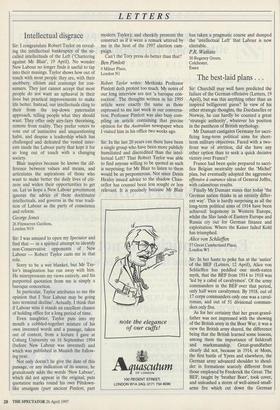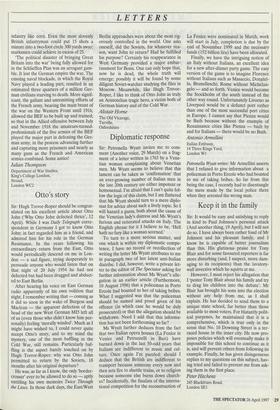Sir: In her haste to poke fun at the 'antics'
of the BEF (Letters, 12 April), Alice von Schlieffen has peddled one moth-eaten myth, that the BEF from 1914 to 1918 was led by a cabal of cavalrymen'. Of the army commanders in the BEF over that period, only half were cavalrymen. By 1918, out of 17 corps commanders only one was a caval- ryman, and out of 51 divisional comman- ders only five.
As for her certainty that her great-grand- father was not impressed with the showing of the British army in the Boer War; it was a view the British army shared, the difference being that the British learned some lessons, among them the importance of fieldcraft and marksmanship. Great-grandfather clearly did not, because in 1914, at Mons, the first battle of Ypres and elsewhere, the German army advanced shoulder to shoul- der in formations scarcely different from those employed by Frederick the Great. The BEF, taught by 'brother Boer', took cover, and unleashed a storm of well-aimed small- arms fire which cut down the German infantry like corn. Even the most slovenly British infantryman could put 15 shots a minute into a two-foot circle 300 yards away; marksmen could achieve in excess of 25.
`The political disaster of bringing Great Britain into the war' being fully allowed for in the Schlieffen Plan was an arrogant gam- ble. It lost the German empire the war. The ensuing naval blockade, in which the Royal Navy played a leading part, resulted in an estimated three quarters of a million Ger- man civilians starving to death. More signif- icant, the gallant and unremitting efforts of the French army, bearing the main brunt of the war on the Western Front until 1916, allowed the BEF to be built up and trained; so that in the Allied offensive between July and November 1918 the amateurs-turned- professionals of the five armies of the BEF played the major part in defeating the Ger- man army, in the process advancing further and capturing more prisoners and nearly as many guns as the French and American armies combined. Some antics!
Julian Thompson
Department of War Studies, King's College London, Strand, London WC2



































































 Previous page
Previous page